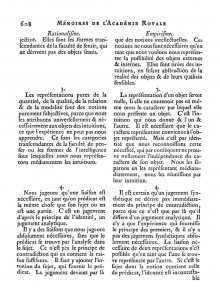Alberto Vanzo writes…
In the late 1780s, few years after the Critique of Pure Reason was published, Kant’s followers engaged in a debate with German experimental philosophers on whose system was superior. Kant’s disciples and his adversaries published tables detailing the differences and comparative advantages of Kant’s rationalism (as it was then classed) over his adversaries’ empiricism, or vice versa. An example is the page of an article by Christian Gottlieb Selle, one of Kant’s early critics,
which you can see below.
In these debates, “empiricism” and “empirical philosophy” were actors’ categories, that is, categories used to single out certain positions within the then current debates. They were used to identify the positions that we too call empiricist, that is, positions claiming that experience provides the basis for all of our knowledge, knowledge of the world, or substantive knowledge, and that there are no innate ideas or substantive a priori principles.
However, the expressions “empirical philosophy” and “empiricism” were in use well before the debates on Kant’s Critique ensued. There are many occurrences these expressions in seventeenth- and eighteenth-century texts. Can we find the now-familiar, standard meanings of “empiricism” in any of them? Let us survey three pre-Kantian uses of “empiricism” or “empirical philosophy”.
Bacon’s empirical philosophers
Francis Bacon famously classes “empirical philosophy” as one of the three kinds false philosophy, alongside the superstitious and sophistic philosophies, in the Novum Organon. However, Bacon’s empirical philosophers are quite different from our familiar empiricists. Bacon identifies empirical philosophers with William Gilbert (the author of De magnete), “the chymists and the whole pack of mechanics”. According to Bacon, these are not empirical philosophers because they reject innate ideas or defend the empirical origins of our knowledge, but because derived “experiments from experiments”, without managing to “convert and digest” them properly so as to develop true theories on their basis (Novum Organon, I, 95). This characterization hardly maps onto our familiar notion of empiricism.
Priestley’s Philosophical Empiricism
Joseph Priestley wrote a pamphlet entitled Philosophical Empiricism. Commenting on the natural-philosophical pronouncements of his unnamed opponent, he writes:
- These and suchlike long-exploded, and crude notions (so many of which I believe were never thrown together into the same compass since the age of Aristotle or Cartesius) are delivered in a manner and phrase so quaint, and a tone so solemn and authoritative, as gives me an idea that I cannot express otherwise than by the term Philosophical Empiricism.
Here, “empiricism” is used to highlight the crudeness of the opponent’s notions. “Philosophical” may allude, somewhat
ironically, to the solemn tone with which they were presented. This is hardly the sense in which Locke, Hume, or Priestley himself would be later called empiricists.
Adam, the Patriarchs, and Empirical Philosophy
If we turn to German texts, we can find yet another use of “empirical philosophy”. Historians of philosophy, like Heumann and Brucker, were embarrassed as to how they should categorize the wisdom of Jewish Patriarchs and early Greek sages. Reports of their deeds, myths, and ancient rules of political prudence show that they made use of their God-given disposition to philosophize. However, it would seem wrong to put their wisdom on a par with the more recognizably philosophical reflections of Socrates or the Pre-Socratics. German historians found a compromise by classing the reflections of the Patriarchs and early Greek thinkers as forms of empirical philosophy, as opposed to scientific, demonstrative philosophical systems which alone are philosophy in a narrow, proper sense.
The “empirical philosophy” of the Patriarchs, just like Bacon’s “empirical philosophers” and Priestley’s “philosophical empiricism”, has little to do with the current notion of philosophical empiricism. This suggests that that notion saw the light only in late eighteenth-century Germany. Or did I miss any earlier, pre-Kantian uses of that notion? If you have any
suggestions, I would love to hear them. Please leave them in the comments or get in touch.


